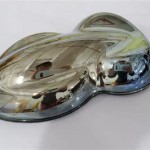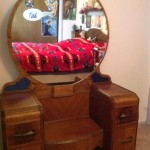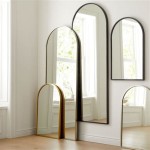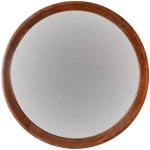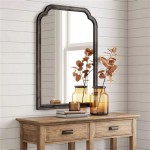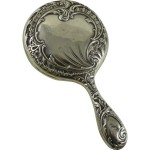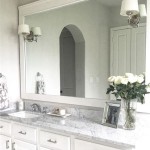Is It Bad Luck To Put A Mirror Facing A Door?
The placement of mirrors has been a subject of numerous superstitions and beliefs across various cultures for centuries. One prevalent belief concerns positioning a mirror directly opposite a door, which is often considered bad luck. This notion stems from various cultural and historical influences interwoven with traditional practices like Feng Shui and Vastu Shastra.
Feng Shui, a Chinese philosophical system of harmonizing individuals with their surrounding environment, plays a significant role in the belief surrounding mirror placement. In Feng Shui, a mirror facing the front door is thought to reflect positive energy, or "chi," back out of the house, preventing good fortune from entering. The front door is considered the "mouth of chi," the primary entry point for energy, and a mirror directly opposite is believed to disrupt this flow.
Similarly, Vastu Shastra, an ancient Indian science of architecture and construction, also addresses mirror placement. According to Vastu Shastra, mirrors should not be placed facing the main entrance. The reasoning aligns with Feng Shui principles, emphasizing the disruption of positive energy flow into the home. It's believed this placement can lead to health issues and financial difficulties for the residents.
Beyond the principles of Feng Shui and Vastu Shastra, other cultural beliefs contribute to the superstition. In some cultures, mirrors are believed to be portals to other realms or dimensions. Placing a mirror opposite a door, therefore, is thought to invite unwanted spirits or energies into the home. This belief likely stems from ancient associations of mirrors with magic and the supernatural.
The belief about mirrors facing doors is also linked to more practical concerns. In earlier times, seeing one's reflection unexpectedly upon entering a dimly lit home could be startling. This sudden surprise could lead to accidents or, at the very least, an unpleasant experience. This practical aspect might have contributed to the negative connotations associated with such mirror placement.
Historically, mirrors were expensive and often considered valuable possessions. Placing a mirror facing a door increased the risk of damage, either from accidental bumps or drafts. This practical concern likely contributed to the idea that such placement was ill-advised, further solidifying the negative association.
While these beliefs are prevalent, it's important to note their subjective nature. The impact of mirror placement is not scientifically proven. Whether or not one adheres to these beliefs depends on individual cultural background, personal beliefs, and interpretation of these traditions.
Modern interior design often incorporates mirrors strategically to enhance light and create an illusion of spaciousness. In these contexts, mirrors may be placed opposite doors for aesthetic reasons, disregarding the traditional beliefs. The functionality and visual appeal often take precedence over superstitious concerns in contemporary design practices.
The principles of Feng Shui and Vastu Shastra, while often intertwined with superstition, offer valuable insights into creating harmonious living spaces. These systems emphasize balance and the flow of energy, promoting well-being and prosperity. While the specific beliefs about mirror placement may be debatable, the underlying principles highlight the importance of mindful design choices.
The belief that placing a mirror opposite a door is bad luck persists in various cultures, influenced by a blend of traditional practices, historical context, and practical considerations. Whether one embraces or dismisses this belief depends on personal convictions and interpretations. Ultimately, the decision of where to place a mirror rests on individual preference and the desired aesthetic and functional qualities within a space.
Understanding the historical and cultural context surrounding this belief provides valuable insight into the diverse perspectives on mirror placement. While some may adhere strictly to traditional guidelines, others prioritize practical and aesthetic considerations. Ultimately, the decision of how to arrange one's living space remains a personal choice, reflecting individual values and priorities.
The continued prevalence of this belief demonstrates the enduring influence of tradition and cultural narratives on our perceptions of the world. While scientific evidence may not support these beliefs, they remain deeply embedded in many cultures and continue to shape how we interact with our surroundings.
Whether one adheres to the traditional beliefs or embraces a more modern approach to interior design, the placement of mirrors within a home remains a significant consideration. It reflects not only aesthetic preferences but also cultural values and personal interpretations of tradition.

Feng Shui Mirror Placement In Front Door Areas Fengshuinexus
:strip_icc()/LightDwell-3095c5279d0b4511b10d154f3a21a9b7.jpg?strip=all)
10 Feng Shui Rules For Mirrors According To Experts

Mirror Facing Bathroom Door Feng Shui Cures And Solutions

7 Feng Shui Mirror Mistakes Red Lotus Letter

21 Feng Shui Mirror Placement Rules And Tips For Your Home Fengshuinexus

Where To Hang Mirrors According Feng Shui Better Homes And Gardens
:strip_icc()/KatherineCarterDesign-3f8b299498274f03953732ece7b6e188.jpg?strip=all)
10 Feng Shui Rules For Mirrors According To Experts

The Feng Shui Of Mirror Placement In Your Bedroom City Mattress

Feng Shui Mirror Placement Tips For The Home Lovetoknow

The Truth About Two Mirrors Facing Each Other Separating Fact From Myth

